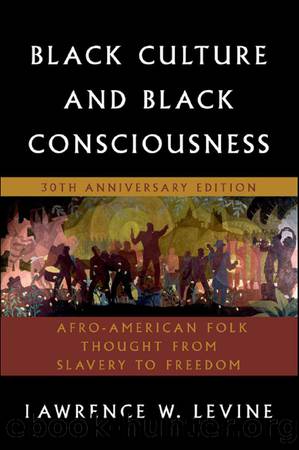Black Culture and Black Consciousness by Levine Lawrence W.;

Author:Levine, Lawrence W.; [Levine, Lawrence W.]
Language: eng
Format: epub
Publisher: Oxford University Press, Incorporated
Published: 2015-03-16T00:00:00+00:00
SECULAR SONG AND CULTURAL VALUES-BLACK AND WHITE
Inquiring into the fate of the English and Scottish ballad in the United States, Stanley Edgar Hyman has asserted, âit has become inadequate narrative, aborted drama, happy-ending tragedy, corrupt and meaningless verbiage, and bad poetry in general. Some of this may be the effect of transmission in time, which seems to degenerate and deteriorate folk literature wherever we can observe its effects. Some of it, however, is certainly the effect of the American ethos, with its denial of death, its resistance to the tragic experience, its deep repression of sexuality, its overriding pieties, and its frantic emphasis on the rationalistic, the inconsequential, and the optimistic.â In those British ballads that survived transplantation to the United States, Hyman argues, magic and the supernatural were dropped or diminished, extrahuman beings such as demons, ghosts, elves, and mermaids were rationalized or humanized, sex was repressed, and such unpleasant human acts as incest and kin-murder were expunged or played down. 1 After many years of collecting folk songs in both Great Britain and the United States, Alan Lomax was impressed by the differences he encountered. The âpaganism,â the âeasy and natural acceptance of the pleasures of the flesh and the bed,â which he found in British song, were foreign to American folklore. âThe British song-tradition in America has been censored, both conscientiously and consciously.â The mass of âgently erotic dittiesâ which in England and Scotland were still common and widely heard, were in America relegated to the ânether worldâ of dirty songs and were replaced by ballads and love songs âshrouded in gloom, drowned in melancholy, and poisoned by sado-masochism.â 2
The same process of denial, dilution, repression, sentimentalization, and trivialization that Hyman and Lomax described has been particularly evident in American popular music. S. I. Hayakawa in his revealing article, âPopular Songs vs. the Facts of Life,â maintained that the lyrics of popular songs âtend towards wishful thinking, dreamy and ineffectual nostalgia, unrealistic fantasy, self-pity, and sentimental clichés masquerading as emotion.â Focusing upon the love songs of the 1920s, 1930s, and 1940s, Hayakawa in his brief analysis demonstrated how the idealization so omnipresent in these songs, by creating impossible demands and dreams, led first to frustration and ultimately to demoralization. 3 My own careful reading of those love songs popular on the American musical stage, in the movies, and on the radio and records during this period supports Hayakawaâs analysis. The titles alone indicate how important the elements of idealistic, dreamlike, magical love were in the hit tunes from 1920 to 1950. The following are typical: Love Will Find A Way, Angel Child, Iâll Build A Stairway To Paradise, Donât Wake Me Up Let Me Dream, Looking At The World Thru Rose Colored Glasses, My Blue Heaven, Dream Lover, Youâre My Everything, Did You Ever See A Dream Walking? ( Well I Did), A Star Fell Out of Heaven, I Married An Angel, You Stepped Out Of A Dream, Youâre Nobody âTil Somebody Loves You. Frustration and disillusionment
Download
This site does not store any files on its server. We only index and link to content provided by other sites. Please contact the content providers to delete copyright contents if any and email us, we'll remove relevant links or contents immediately.
| Fairy Tales | Folklore |
| Mythology |
Circe by Madeline Miller(8146)
Confessions of an Ugly Stepsister by Gregory Maguire(7891)
A Court of Wings and Ruin by Sarah J. Maas(7853)
Burn for You (Slow Burn Book 1) by J.T. Geissinger(7095)
The Bird and the Sword by Amy Harmon(5381)
A Lesson in Thorns (Thornchapel Book 1) by Sierra Simone(5086)
Into the Drowning Deep by Mira Grant(4483)
Stolen (Alpha's Control Book 1) by Addison Cain(4190)
The Queen and the Cure (The Bird and the Sword Chronicles Book 2) by Amy Harmon(4187)
Mythology by Edith Hamilton(3768)
Pernicious Red (When The Wicked Play Book 1) by Natalie Bennett(3521)
Run Little Wolf (The Forest Pack Series Book 1) by G. Bailey(3513)
The Queen and the Cure by Amy Harmon(3338)
(Maiden Lane #5) Lord of Darkness by Elizabeth Hoyt(3101)
Lost Boy by Christina Henry(3021)
Mythos by Stephen Fry(2870)
The Fairy Queen (The Dark Queens Book 6) by Jovee Winters(2820)
Persephone by Kitty Thomas(2707)
Bunny by Mona Awad(2450)
